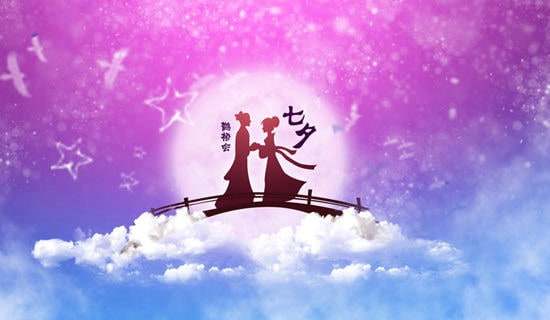- 相关推荐
关于七夕节的英文介绍
七夕节,又称七巧节、七姐节、女儿节、乞巧节、七娘会、七夕祭、牛公牛婆日、巧夕等,是中国民间的传统节日。以下是小编整理的关于七夕节的英文介绍,希望对大家有所帮助。

关于七夕节的英文介绍
Raise your head on August 16 and gaze at the stars, you will find something romantic going on in the sky. VALENTINES Day in China, the seventh day of the seventh lunar month, falls on August 7 this year.
That is, on Thursday evening, Niu Lang and Zhi Nu will meet on a bridge of magpies(鹊桥) across the Milky Way(银河). Chinese grannies will remind children that they would not be able to see any magpies on that evening because all the magpies have left to form a bridge in the heavens with their wings.
Long long ago, there was a handsome and clever boy.
She was the youngest and she was good at weaving. They had a lovely boy and a pretty girl.
Her mother was very angry about the marriage.
She asked her daughter to come back.
She had to leave.
The old buffalo said that he could die at any time.
It’s called the Milky Way.
The moved magpies came to help.
Thousands of magpies flew together.
They formed a bridge over the Milky Way.
Each year, on the seventh day of the seventh month, the magpies would flock together to form a bridge。
Now, the Double Seventh Festival is also called the Chinese Valentines Day.
七夕节民间传说
The Qixi Festival, also known as the "Festival" or "daughter Festival", this is a holiday China traditional festival of the most romantic past, is the most important day of the girls. At night, seven at the beginning of July the weather is warm, vegetation, shining stars in the sky, a vast expanse of whiteness of the Milky Way like a bridge across the north and south, in the river on both sides, each with a shining star, across the river, the relative distance that is Altair and vega.
About the story we all know, China is the fairy tale, the story reminds us of the Qixi Festival this holiday. Talking about the source of Qixi, in fact, "Qixi" originated from the worship of nature. From the history of literature, at least three thousand or four thousand years ago, as peoples understanding of astronomy and textile technology, qianniuxing Vega records have. Worship of stars are far more than the Altair and Vega, they think the four corners of the world each have seven star for range of stars, called the twenty Basu, the Big Dipper is the brightest, to identify the direction of the night. The first star of the Big Dipper is called Kuishou Kuixing. Later, the imperial examination system, called the "Quebec world champion", reading to the Qixi Festival called "kuixinglou Festival", also known as the "Sun Book Festival", the earliest to keep the Qixi Festival from the stars worship.
Later, with the Qixi Festival known mostly the cowherd story, because it is full of myth, let people a vision of a real life, there is an expectation of love. The girl weaver story is passed on July at the beginning of seven, the Magpies would go flying in the Milky Way for the ride cowherd dating meet. In addition, the Qixi Festival night, people can hear the Vega silently whispers in the sky in the stand of grapes or other fruit. Although this story is legend, but in the real world, every Tanabata Festival, many lovers will wait and see on the moon, because it is also very romantic mood.
传统习俗
1、香桥会
In yixing, jiangsu province, there are qixi xiangqiao customs.
(在江苏宜兴,有七夕香桥会习俗。)
Every year on the Chinese valentines day, people come to take part in the festival.
(每年七夕,人们都赶来参与,搭制香桥。)
2、接露水
In the countryside of zhejiang province, the custom of catching dew with washbasin is popular.
(浙江农村,流行用脸盆接露水的习俗。)
It is said that the dew on the Chinese valentines day is the tears when the cowherd and weaver girl meet.
(传说七夕节时的露水是牛郎织女相会时的眼泪,如抹在眼上和手上,可使人眼明手快。)
3、拜七姐
July 7s seven nianghui, guangdong called "worship seven sister", fujian Taiwan is called "worship seven niangma".
(七月七的七娘会,广东多称“拜七姐”,闽台即称为“拜七娘妈”。)
4、穿针乞巧
Threading, also known as "sai qiao", that is, womens competition threading.
(穿针乞巧,也叫“赛巧”,即女子比赛穿针。)
They were decorated with colored thread and wore seven-hole needles. The faster they wore, the more they begged.
(她们结彩线,穿七孔针,谁穿得越快,就意味着谁乞到的巧越多。)
5、喜蛛应巧
The tarantula should also be an earlier way of begging.
(喜蛛应巧也是较早的一种乞巧方式。)
The custom is a little later than threading needle begging, roughly from the northern and southern dynasties.
(其俗稍晚于穿针乞巧,大致起于南北朝之时。)
【七夕节的英文介绍】相关文章:
英文介绍信05-13
英文自我介绍05-11
英文的介绍信07-11
it英文自我介绍08-19
英文的自我介绍06-29
自我介绍英文07-05
经典英文自我介绍06-21
英文自我介绍06-16
it英文面试自我介绍04-18
英文介绍信范文04-28